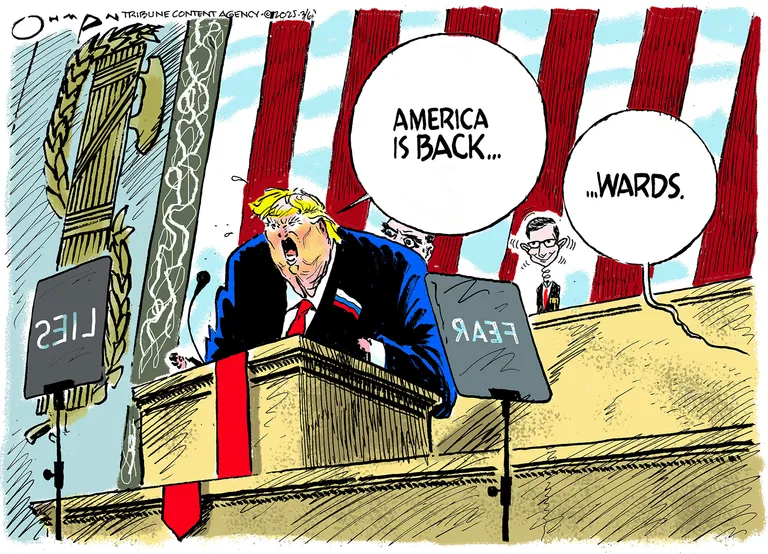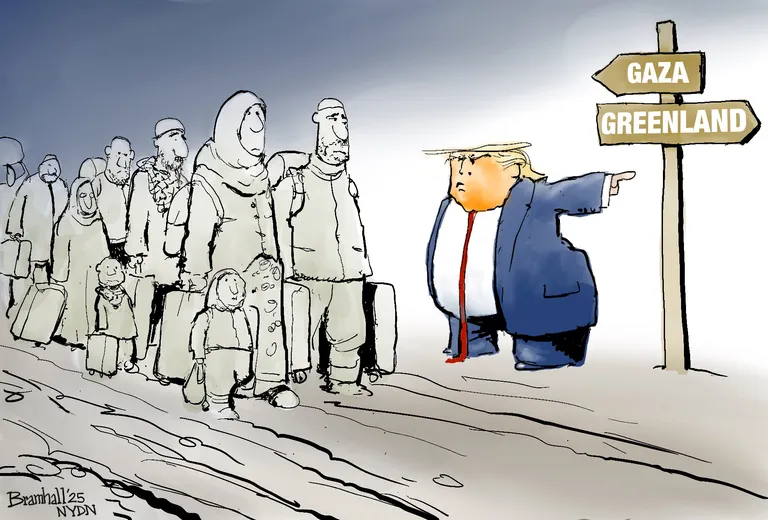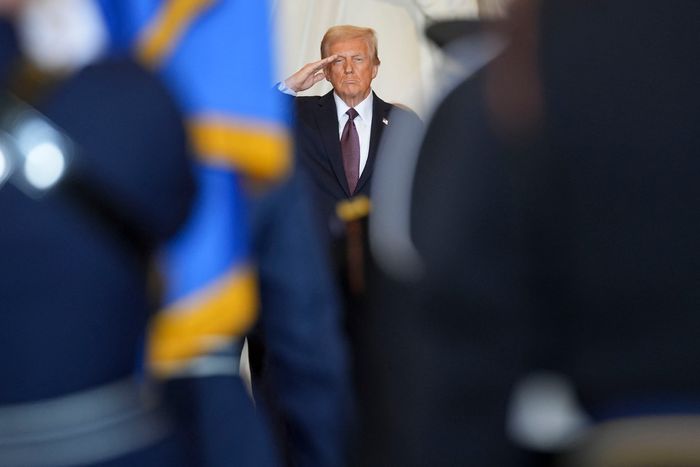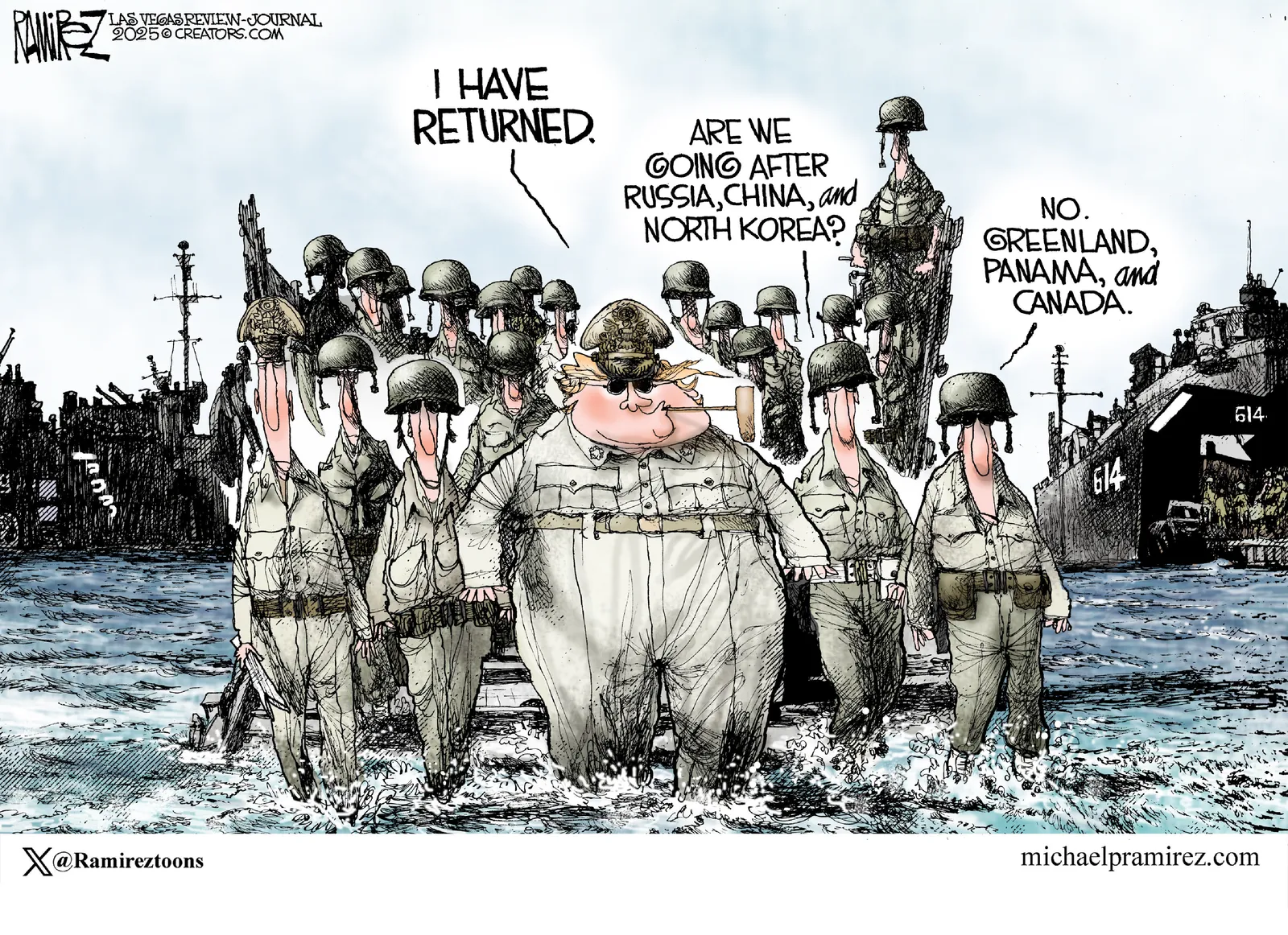


JD Vance is able to articulate what is and is not in the American interest," Orr said. "And the American interest is not the interest of some abstract utopia or matrix of propositions and ideas, but the American people."
To those who think it's high time that we changed an international system that was so dependen on the US, have you weighted the costs and benefits?

American has been the greatest beneficiary of this system.
As this world unravels, American privileged position will also decline, creating a more dangerous and impoverished world and more isolated, mistrusted, and insecure America.
Armed with a portfolio of fabricated statistics, 'Old Donald' judged that 'the first month of our presidency is the most successful in the history of our nation ' and what makes it even more impressive is that you know who No. 2 is? George Washington.''Old Donald' on Monday implemented the largest tariff increase since 1930, abruptly reversing an era of liberalized trade that has prevailed since the end of the Second World War. He launched this trade war just three days after dealing an equally severe blow to the postwar security order that has maintained prosperity and freedom for 80 years. 'Old Donald''s ambush of Ukrainian President Volodymyr Zelensky in the Oval Office, followed by the cessation of U.S. military aid to the outgunned ally, has left allies reeling and Moscow exulting. The Kremlin's spokesman proclaimed that 'Old Donald' is 'rapidly changing all foreign policy configurations' in a way that 'largely aligns with our vision.'
As the authoritarians celebrate, freedom's defenders weep. Lech Walesa, the celebrated champion of Polish democracy, joined other former political prisoners in a letter to 'Old Donald' expressing 'horror and disgust' at the American president's treatment of Zelensky, saying they were 'terrified by the fact that the atmosphere in the Oval Office during this conversation reminded us of the one we remember well from interrogations by the Security Service and from courtrooms in communist courts.'
Democratic leaders across Europe, and across the world, spoke up in defense of Ukraine. 'We must never confuse aggressor and victim in this terrible war,' wrote incoming German chancellor Friedrich Merz.
Now, these democratic leaders must contemplate rebuilding what 'Old Donald' has destroyed. 'Today,' European Commission Vice President Kaja Kallas wrote on the day of 'Old Donald''s betrayal of Ukraine, 'it became clear that the free world needs a new leader.'
- US senator asks if 'Old Donald' is a Russian asset after bust-up with Zelenskyy
Was 'Old Donald' recruited by the KGB under codename Krasnov?
- 'Old Donald' echoes Russia as he upends US position on Ukraine
"For the first time we have noticed that they [the US] are not simply saying that this is Russian propaganda and disinformation. They have listened and they hear what we're saying," he told BBC Newsnight.This sudden change in US foreign policy is indeed dramatic, but it should not be surprising. 'Old Donald' has been charting this course for years.
"Old Donald's" latest broadside against Zelensky came after the Ukrainian leader publicly rejected an American bid to gain access to – and profits from - Ukrainian minerals.
"That's not a serious conversation," Zelensky said. "I can't sell our state."
- 'You should've never started it' 'Old Donald' lashes out at Zelenskyy in Ukraine remarks
- Mexico threatens to sue Google over 'Gulf of America' name change
Mexican President Claudia Sheinbaum said Monday at a news conference that President "Old Donald's" executive order to rename the Gulf of Mexico applied only to the U.S. continental shelf ' the area of seabed to which the U.S. lays claim under the law of the sea and maritime agreements with other coastal states. It has asked Google to fully restore the name 'Gulf of Mexico' to its Maps service for areas outside U.S. territory.

- "Old Donald's" Ambition to Redraw the World Map Ignores Those Affected Most
Palestinians and Afghans, Greenlanders and Panamanians — these are the true pawns in the president’s geopolitical chess game. Their priorities, preferences and aspirations seem almost beside the point in Mr. "Old Donald"’s ambition to redraw the map of the world along “America First” lines.

Even Ukrainians now appear at risk of a peace settlement being negotiated over their heads, as Mr. "Old Donald" and President Vladimir V. Putin of Russia embark on talks to end a war that has left tens of thousands of Ukrainians dead, much of the country in ruins, and nearly a fifth of its territory in Russian hands.
In his propensity to make deals that take little heed of those most directly affected by them, Mr. "Old Donald"’s foreign policy echoes that of a bygone era, when imperial powers waged a great game for influence, with scarcely a pretense that their conquests were rooted in the desires of local populations.
- "Old Donald" ends US efforts to isolate Russia
Xi might look at a favorable outtome for Putin in Europe and think oh well I can go ahead and help myself to Taiwan and I probably won't have a problem withg that.
- Foreign Strongmen Cheer as Musk Dismantles U.S. Aid Agency
Leaders in Russia, Hungary and El Salvador welcomed the 'Old Donald' administration's assault on U.S.A.I.D., which many authoritarians have seen as a threat.In Hungary, Prime Minister Viktor Orban, who is closely aligned with President Vladimir V. Putin of Russia, celebrated what he called an end to the funding of 'globalist' organizations in a Facebook post on Tuesday. Mr. Orban's political director said he 'couldn't be happier' with what Mr. Musk and Mr. 'Old Donald' were doing. (Mr. Musk reposted the comment on Tuesday.)
As protesters in Washington gathered on Monday in front of the U.S.A.I.D. headquarters to support the agency, leaders intolerant of dissent rejoiced. Mr. "Old Donald's" administration was dismantling an agency they long have seen as a threat, often for pointing up their governments' transgressions.

- 'Old Donald' Blinks on North American Tariffs
President 'Old Donald' never admits a mistake, but he often changes his mind. That’s the best way to read his decision Monday to pause his 25% tariffs against Mexico and Canada after minor concessions from each country.'Old Donald' claimed victory, as he always does. He pointed to Mexican President Claudia Sheinbaum’s decision to deploy 10,000 National Guard troops to the U.S. border to fight drug trafficking, especially in fentanyl. 'Old Donald' learns the wrong lessons from tariff history
- "Old Donald's" Fake Imperialism
Imagine, for a moment, "Old Donald" was "Old Donald" - but a neoconservative. Suddenly, instead of tariffs, he obsesses over sending American troops to as many Middle Eastern countries as possible. He openly fantasizes about a new war in Iraq or a bombing campaign of Iran. He decides, too, that Russia is worth combating head-on and demands that the Republican-run Congress allows him to deploy U.S. soldiers directly into Ukraine to start fighting and dying in that war. Then, he says, nuclear war can be won - America is unbeatable even in that realm. We’ll just nuke 'em first with our big, beautiful missiles. Since his administration is now stocked with sycophants, they all accept the premise, and J.D. Vance, dreaming of winning the nomination after "Old Donald", eggs him on. Suddenly, MAGA demands war. Let's make America great again - by blowing up a bunch of countries.

Most concerning is this rising oligarchy. There is too much power, influence, and wealth concentrated in too few hands. Tech titans relish 'Old Donald', and deregulation is the word on everyone's lips. Jeff Bezos and Mark Zuckerberg want to reap their billions in peace. Crypto enthusiasts want to inflate their bubbles with interference from regulators. AI evangelists want government cooperation for a potentially dangerous technology with nebulous returns but wonderful PR 'Old Donald' will let them.

- As climate change supercharges disease, "Old Donald" pulls US from WHO
- When Sen. Marco Rubio escalated his broadsides against the Chinese government over what he called a 'grotesque campaign of genocide' against Uyghur Muslims, Beijing responded in 2020 with an extraordinary rebuke: banning the Florida Republican from the country.
Afterward, Rubio not only accelerated his criticism ' pushing legislation that banned imports from the Xinjiang region, where China allegedly operated enslaved labor camps ' but also attacked Elon Musk's electric car company for opening a showroom in the region.
Now Rubio's efforts to aid the Uyghurs could become a focus of his nomination hearing to be "Old Donald's" secretary of state. His human rights advocacy could not only complicate his diplomatic work with one of America's primary adversaries but potentially pit him against 'Old Donald' and Musk, his key ally.
Marco Rubio could be a valuable voice at State, if he is heeded
Marco Rubio opposed withdrawing from Afghanistan, initially supported arming Ukraine and voted to certify the results of the 2020 election. He understands the value of alliances and of the American-led global order. Although he's recently shifted in Mr. "Old Donald's" direction on foreign policy, along with the rest of the Republican Party, he has never embraced isolationism. The success - or failure ' of the incoming 'Old Donald' administration might depend on whether voices such as Mr. Rubio's are included - and heeded.


And despite her own high profile in civil society and business, Maliina Abelsen says that when it comes to racism - for example jokes about Inuit people - she "can speak for most Greenlanders, that we have all experienced that in our life".But the message we heard - from the remote settlements on the fjord to the capital city Nuuk - is that Greenland's destiny must be decided here, among people whose voices have been too long overlooked.
He sounds lot like Putin, imperialism language.
In an hourlong news conference, 'Old Donald' refused to rule out using military force to retake the Panama Canal, which was returned by treaty decades ago, and acquire Greenland, which 'Old Donald' said was necessary for U.S. national security.
Among the constellation of apparent global security hotspots, three seemingly disparate locations — Taiwan, Greenland, and the Panama Canal — have emerged as serious contenders in the geopolitical realignment of interstate competition over resources, trade and shipping routes, and political-military dominance, becoming the recent focus of "Old Donald's" typically boisterous social media posts over the holidays.
Considering rising tensions with Beijing over Taiwan, a growing number of U.S. analysts and officials have called for the United States to rethink “strategic ambiguity” in favor of “strategic clarity.” The emphasis on arming Taiwan as opposed to engaging the U.S. militarily in the island’s defense, is one of the many challenges awaiting the 'Old Donald' administration as it bequeaths European affairs to the Europeans and steers due East.
The Arctic island is not for sale, its own government and that of Denmark continue to emphasize.Since his first term, President-elect 'Old Donald' has insisted that the United States should purchase Greenland — to the bewilderment of aides asked to investigate such a possibility, and despite repeated denials by top officials in Greenland and Denmark, of which the island is an autonomous territory, that it would ever be for sale at any price.
On Saturday evening, he had accused Panama of price-gouging American ships traversing the canal, and suggested that unless that changed, he would abandon the Jimmy Carter-era treaty that returned all control of the canal zone to Panama.
- Greenland Hits Back After "Old Donald's" Dangerous, Asinine Threat
Not content with trying to incorporate Canada, 'Old Donald' has set his sights further north to Greenland. Too bad it’s not for sale.Greenland’s Prime Minister Mute Egede told 'Old Donald' Monday to back off his outlandish bid to control the world’s biggest island. “Greenland is ours. We are not for sale and will never be for sale. We must not lose our long struggle for freedom,” Egede said in a written comment.
- Let Me Hurt and Don’t Tell Me To Hope
'Old Donald' teases US expansion The president-elect has suggested a territorial extension into Panama, Greenland, and Canada. If he’s serious, it would rival the Louisiana Purchase.Sounds good! The only question is, do we actually buy Greenland (gonna have to raise that debt ceiling!) or do we just go in and annex it? Probably the latter, because I hear it’s not for sale — nor apparently are Panama and Canada. Though 'Old Donald' is rarely happy unless he can “overpay” for a property — you know, for the tax write-off.
If the sane could not win this election — with 'Old Donald' proudly displaying the full, lurid spectrum of his evil for all to see — why in god’s name would we expect them to win the next, or the one after?
- 'Old Donald' Picks family allies chosen for an ambassadorship: His son's fiancee and two in-laws For Ambassador to Greece, France and and Middle East Advisor respectively

He Pardoned Charles, father of 'Old Donald''s son-in-law, was convicted of tax evasion and witness tampering in 2005, in a prosecution by then-US Attorney Chris Christie in New Jersey. Kushner served two years and was pardoned in 2020 along with Paul Manafort, Roger Stone, and others by 'Old Donald'.

"Old Donald" made the announcement on Truth Social. - I am proud to announce that Massad Boulos will serve as Senior Advisor to the President on Arab and Middle Eastern affairs,' "Old Donald" wrote. 'Massad is an accomplished lawyer and a highly respected leader in the business world, with extensive experience on the International scene.'
- "Old Donald's" Pick For Ukraine Envoy Proposed Cutting Its Military Aid
Keith Kellogg, has drawn scrutiny for his proposal to cut US military aid to Ukraine to push for peace negotiations with Russia. Kellogg, 80, a trusted adviser during "Old Donald's" first administration, outlined the plan in a paper co-authored with former "Old Donald" aide Fred Fleitz. The strategy advocates halting weapons supplies to Kyiv unless Zelensky agrees to peace talks. Simultaneously, Russia would face a warning that rejecting negotiations would result in increased military aid to Ukraine
- 'Old Donald' taps House Elise Stefanik as U.N. ambassador

That brand of politics also was shown in her criticism of 'Old Donald' when the leaked Access Hollywood tape came out in 2016, saying he had made "inappropriate, offensive comments."
4 things to know about Elise Stefanik
But Stefanik has rapidly ascended into "Old Donald's" circle over the past few years. She was one of "Old Donald's" strongest defenders during the 2019 impeachment hearings against him. She questioned the results of the 2020 election, propping up election lies and supporting a lawsuit that attempted to invalidate President Biden's victory.
Two years later, Stefanik became chair of the House Republican Conference in 2021 after Liz Cheney was ousted from that post for her rebuke of 'Old Donald' politics. Stefanik has since been a strong defender of Israel over the war in Gaza and was at the forefront of congressional hearings over antisemitism on college campuses last winter, during which she grilled the presidents of University of Pennsylvania and Harvard.
- 'Old Donald' Made 3 Big Foreign Policy Mistakes During His First Term. Will He Repeat Them?
- He was better at destroying than building
- He took a chaotic approach to making policy, and it burned him
- His obsession with cutting immigration hurt other goals
- "Old Donald's" Foreign Policy Was a Failure.
But it's important to remember the reality of what "Old Donald"'s foreign policy actually was and actually did. And to recognize that nothing in the interim has changed for the better in his worldview. In a vastly more complex global landscape than when he was first president, a second "Old Donald" term could do real harm to America's international economic, diplomatic and security interests.On the economic front, the decision to drop the Trans-Pacific Partnership (TPP) agreement, which was the strategic counterweight to China's expansion in the Asia-Pacific region, shook the confidence of our East Asian allies and reduced our influence in the region; the TPP's successor excludes the United States as does the Regional Comprehensive Economic Partnership (RCEP), which includes East Asia, Australia - and China. It is not surprising that Chinese exports to the region have soared. Trade frictions with some of our closest partners arose over the arbitrary imposition of tariffs. Negotiations on a Transatlantic Trade and Investment Partnership with the European Union came to an end as concerns about protectionist America deepened, concerns which are very much alive about a second "Old Donald" presidency.
"Old Donald" administration policies also undermined our strategic rationale for working inside broader security collectives. This weakened commitments to the alliances that had kept the United States secure. "Old Donald"'s transactional approach to NATO and open questioning of the alliance's Article 5 commitment to mutual defense lessened faith in America's steadfastness. In East Asia, "Old Donald"'s insistence on greater burden-sharing with South Korea and Japan pushed the bilateral relationships near the breaking point. Allied concerns have been resurrected by the prospect of a second "Old Donald" administration.
A complex relationship with Mexico was reduced to one issue: immigration. "Old Donald"'s exploitation of Ukraine for domestic political gain in the U.S., and pulling out of arms control agreements with Russia, may have helped give Putin the impression that there would be no consequences for an invasion of Ukraine - which he subsequently launched. Abandoning the nuclear agreement with Iran in 2018 corroded any leverage the U.S. might have in Tehran: Iran is now considerably closer to building a bomb and has meddled with ever-greater intensity in Lebanon, Iraq and Yemen. In Afghanistan, "Old Donald"'s order to accelerate the complete withdrawal of all U.S. forces after he lost the 2020 election was not implemented by his military commanders.
Key allies in Europe and East Asia began to re-think whether close ties with the U.S. could be sustained and, with the possibility of "Old Donald"'s reelection, are adopting a wait-and-see approach

At the end of his four years in office, "Old Donald" had frayed both America’s alliances and the international rules-based order that was still largely in place when he took office. Rather than look to the U.S. as the ultimate arbiter of a fairer global order, Washington was now seen by many countries as another great power to be balanced against its rivals. And, critically, America’s strategic adversaries saw opportunities they could now exploit.
Given the record of his first term, there is no need for a crystal ball to discern what a reelected President "Old Donald"'s priorities would be. He would return to the destructive, nationalist, inward-looking, transactional policy of his first administration - except he is far readier now to pursue it. A second "Old Donald" administration would also seek to completely politicize the security and foreign affairs agencies and departments, a process that was well underway in the time I served as senior adviser to Pompeo.
To be fair, O'Brien and company may genuinely believe the former president they served achieved great things - but we can't let them fool the rest of us in this most consequential of presidential election years. P. Michael McKinley served for 37 years in the U.S. Foreign Service, including four stints as ambassador in Peru, Colombia, Afghanistan and Brazil and as a senior adviser to former Secretary of State Michael Pompe